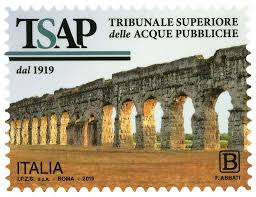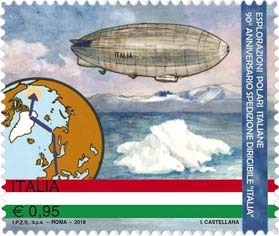POSTE ITALIANE 45^ emissione del 19 Settembre 2019 di un francobollo celebrativo del Tribunale Superiore delle Acque Pubbliche, nel centenario dell’istituzione.
POSTE ITALIANE 45^ emissione del 19 Settembre 2019 di un francobollo celebrativo del Tribunale Superiore delle Acque Pubbliche, nel centenario dell’istituzione.
Il Ministero dello Sviluppo Economico ha emesso il 19 settembre 2019 un francobollo celebrativo del Tribunale Superiore delle Acque Pubbliche, nel centenario dell’istituzione, relativo al valore della tariffa B, corrispondente ad € 1.10.

- data / date 19 settembre 2019
- dentellatura / serration 11
- stampa / printing fustellatura/rotocalco
- tipo di carta / paper type bianca patinata neutra
- stampato / printed I.P.Z.S. Roma
- tiratura / edition 800.000
- fogli / sheet 45
- dimensioni / dimension 40 x 30 mm
- costo / price B = € 1,10
- bozzettista/ designer Fabio Abbati
- num. catalogo MI 4142 YT 3903
Il Tribunale Superiore delle acque pubbliche è un organo giurisdizionale dell’ordinamento italiano istituto con RDL 1775/1933, recante Testo unico sulle acque e impianti elettrici. Ha sede nel Palazzo di Giustizia a Roma ed ha competenza su tutto il territorio nazionale.
Competenza
Il Tribunale Superiore delle acque pubbliche decide in grado di appello le cause in materia di diritti soggettivi, ai sensi dell’art. 142 T.U. n. 1175/1933, sulle controversie relative alla demanialità delle acque, per i limiti dei corsi d’acqua, bacini idrici naturali od artificiali, sugli alvei e sulle sponde dei fiumi, ecc.; controversie relative a diritti relativi alle derivazioni e utilizzazioni di acque pubbliche; controversie riguardanti l’occupazione a qualunque titolo di fondi e terreni e conseguenti indennità; controversie per risarcimenti di danni dipendenti da qualunque opera eseguita dalla pubblica amministrazione; ricorsi previsti dagli artt. 25 e 29 del RD 8 ottobre 1931 n. 1604, recante TU delle leggi sulla pesca.
Quale organo di giurisdizione amministrativa il tribunale Superiore ha competenza in materia di interessi legittimi, ai sensi dell’art. 143 T.U. acque, sui ricorsi per incompetenza, per eccesso di potere e per violazione di legge avverso i provvedimenti presi dalla amministrazione in materia di acque pubbliche; sui ricorsi, anche per il merito, contro i provvedimenti dell’autorità amministrativa relativi all’esecuzione di opere idrauliche di cui all’art. 217 T.U. acque; in tema di contravvenzioni che alterino lo stato delle cose, nonché contro i provvedimenti adottati dall’autorità amministrativa in materia di regime delle acque pubbliche di cui all’art. 221 T.U. acque; sui ricorsi in materia di diritti esclusivi di pesca.
Infine, ha competenza sia in grado di appello che in sede di legittimità anche per le controversie relative alle acque pubbliche sotterranee e per quelle concernenti la ricerca, l’estrazione e l’utilizzazione delle acque sotterranee nei comprensori soggetti a tutela sempre che le controversie interessino la pubblica amministrazione.
Composizione
del Tribunale è così composta: un Presidente, equiparato al Procuratore Generale della Corte Suprema di Cassazione, un Presidente supplente, quattro Consiglieri di Cassazione, quattro Consiglieri di Stato e tre esperti.
Composizione del collegio
Se la sentenza si emette in grado di appello si decide con cinque votanti: il Presidente, due consiglieri di Cassazione, un consigliere di Stato e un tecnico; se viene emessa in sede di giurisdizione amministrativa si decide con sette votanti: il Presidente, due consiglieri di Cassazione, tre consiglieri di Stato e un tecnico.
Prospettive di riforma
L’esiguità delle sentenze emanate, in appello delle 8 sedi dei Tribunali regionali delle acque pubbliche, avevano portato il Governo col decreto legge 11 novembre 2002, n. 251 alla soppressione sia dei Tribunali regionali che del Tribunale superiore delle acque pubbliche, con contestuale suddivisione delle competenze tra i giudici ordinari e i tribunali amministrativi regionali.
Tuttavia la legge di conversione 10 gennaio 2003, n. 1, non ha ratificato tale parte del decreto, limitandosi a modificarne la composizione per sanare la sentenza di illegittimità costituzionale della Corte costituzionale.
Se sei interessato all’acquisto del francobollo lo puoi acquistare al prezzo di € 1,50. Inviami una richiesta alla email: protofilia1@gmail.com

The Superior Court of Public Waters is a jurisdictional body of the Italian legal system with Royal Decree n. 1775/1933, concerning the Consolidated Law on water and electrical installations. It is based in the Palazzo di Giustizia in Rome and has jurisdiction over the entire national territory.
Competence
The Superior Court of Public Waters decides in a position to appeal the cases concerning subjective rights, pursuant to art. 142 T.U. n. 1175/1933, on disputes related to the demaniality of the waters, for the limits of water courses, natural or artificial water basins, on the beds and on the banks of the rivers, etc .; disputes relating to rights relating to derivations and uses of public waters; disputes concerning employment for whatever reason of funds and land and consequent indemnities; disputes for compensation for damages caused by any work carried out by the public administration; appeals provided for in articles 25 and 29 of the RD 8 October 1931 n. 1604, containing TU of the laws on fishing.
As a body of administrative jurisdiction, the Superior Court has jurisdiction in matters of legitimate interests, pursuant to art. 143 T.U. waters, on appeals for incompetence, for excess of power and for violation of the law against the measures taken by the administration regarding public waters; on appeals, including on the merits, against the provisions of the administrative authority relating to the execution of hydraulic works pursuant to art. 217 T.U. water; on the subject of fines that alter the state of things, as well as against the measures adopted by the administrative authority with regard to the public water regime pursuant to art. 221 T.U. water; on appeals concerning exclusive fishing rights.
Finally, it has competence both in terms of appeal and in terms of legitimacy also for disputes relating to underground public waters and for those concerning the research, extraction and use of groundwater in the areas subject to protection, always in the case of disputes affecting the public administration.
Composition
of the Tribunal is as follows: a President, equivalent to the Attorney General of the Supreme Court of Cassation, an alternate President, four Cassation Councilors, four State Councilors and three experts.
Composition of the college
If the sentence is issued in a grade of appeal, it is decided with five voters: the President, two Cassation councilors, a State councilor and a technician; if it is issued in the administrative jurisdiction it is decided with seven voters: the President, two Cassation councilors, three State councilors and a technician.
Prospects for reform
The insignificance of the sentences issued, in appeal of the 8 seats of the regional courts of public waters, had brought the Government with the decree law 11 November 2002, n. 251 to the suppression both of the regional courts and of the superior court of public waters, with simultaneous subdivision of the competences between the ordinary judges and the regional administrative courts.
However, the conversion law of 10 January 2003, n. 1, has not ratified this part of the decree, limiting itself to modifying its composition to remedy the constitutional sentence of the Constitutional Court.
If you are interested in buying the stamp you can buy it for € 1.50. Send me a request to the email: protofilia1@gmail.com

- data / date 19 settembre 2019
- dentellatura / serration 11
- stampa / printing fustellatura/rotocalco
- tipo di carta / paper type bianca patinata neutra
- stampato / printed I.P.Z.S. Roma
- tiratura / edition 800.000
- fogli / sheet 45
- dimensioni / dimension 40 x 30 mm
- costo / price B = € 1,10
- bozzettista/ designer Fabio Abbati
- num. catalogo MI 4142 YT 3903






